An Acrobat‘s Heart
I met her back then in Munich (in the summer of 2000), and she told me, at one point, about sensitive moments in the production. Once, in the morning, she felt her energy waning, couldn’t make the appointment, everything was up in the air. Manfred Eicher carefully knocked at her door. Helpful words, encouragement. It ended well. Fortunately. By the way, she never got together with Brian Eno (they would have made an interesting pair in the studio), but once, early in the seventies, he lent her a wonderful pair of old horn loudspeakers, she fell in love with their sound and never gave them back.In meinem Jahresrückblick tauchen ungewöhnlich viele Frauenstimmen auf, aus lang vergangener wie heutiger Zeit, Julia Holter, Laurie Anderson, Feliciá Atkinson, Jessica Pratt (you miss something between „Twin Peaks“ and „deep, deep mood music“ if you miss Jessica‘s „Here In The Pitch“), Beth Gibbons, Joni Mitchell, Anne Briggs, Annette Peacock. All diese Alben haben für mich etwas Unwiderstehliches, und ich kann nie anders, als sie am Stück zu hören. Vor Tagen lauschte ich wieder einmal Laurie Andersons „Hörspiel“ über den letzten Flug von Amelia Earhart, und war so gefangen von ihrem stimmlichen Vortrag, dass ich Raum und Zeit um mich vergass, in ihrer alten Klapperkiste, auf ihrer allerletzten Reise.
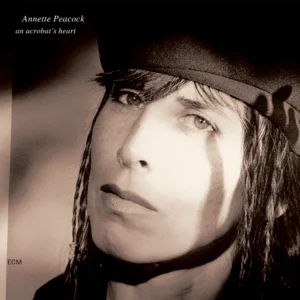
Und am Tag darauf kam Annettes letztes Songalbum bei mir an, das im Jahr 2000 entstand. Erstmals nun als Schallplatte, genauer gesagt, als Doppelalbum, in der ECM-Reihe „Luminessence“. Makellose Pressung, exzellenter Sound (was ja nun keine Überraschung ist). Neben ihrem Gesang ist Annette am Piano zu hören, allein das Cicada String Quartet begleitet sie. Jan Erik Kongshaug sitzt am Mischpult, und Manfred Eicher ist der Produzent im Rainbow Studio. (Those were the days.)
Einst, in ihren jungen Jahren, war sie eine so eigensinnige wie sinnliche Erscheinung. Viele Männer hielten Hof, Timothy Leary war einer von ihnen. Obwohl mir ihre skurrile „Annette Peacock Paul Bley Synthesizer Show“ als Album stets ein Rätsel blieb, das vielleicht nur Konrad Heidkamp und das Liebespaar Bley – Peacock entschlüsseln konnten, waren ihre Soloalben durchweg wagemutige, auf seltsame Art zugängliche, wundervolle, ja, genau, wundervolle Trips, die nie einem einzigen Stil treu blieben und brisantes Fremdgehen betrieben zwischen Funk und Free Jazz, Blues und Elektronik, Avantgarde, Rock und ganz und gar unklassischem Songwriting.
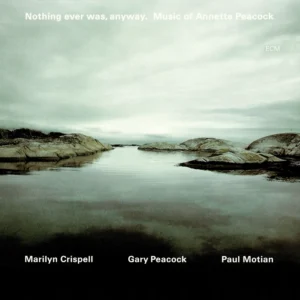
Wie betörend ihre Kompositionen sein konnten, brachte Paul Bley etwa auf „Open, To Love“ zu Gehör, allein am Klavier. Jahrzehnte später Marylin Crispell mit „Nothing Ever Was, Anyway – Music of Annette Peacock“. Für das kammermusikalische Szenario von „An Acrobat‘s Heart“ (mit einem Hauch von Folk, den ich nie ding- und ortfest machen kann), gab es einmal mehr keinen Vorläufer unter ihren eigenen Alben, und unter anderen sowieso nicht. Klappt man das Gatefold-Cover auf, finden sich die lyrics, die wider allen Mainstream-Empfindsamkeiten, Liebesdingen und Erinnerungen auf den Grund und Abgrund gehen – die Bilder der Worte so elementar, so klar, und doch kaum zu fassen. Fragile Sphären, unzerbrechlich!
Ich traf sie damals in München, und sie erzählte da auch von sensiblen Momenten der Produktion. Einmal, morgens spürte sie ihre Energie schwinden, konnte den Termin nicht wahnehmen, alles hing in der Luft. Es nahm ein gutes Ende. Zum Glück. „An Acrobat’s Heart“. Mit Brian Eno ist sie übrigens nie zusammengekommen (das wäre auch ein interessantes Paar im Studio gewesen – die „Annette Peacock Brian Eno Synthesizer Show“ hätte ich zu gerne erlebt), aber einmal, früh in den Siebzigern, lieh er ihr ein wunderbares Paar alter Hornlautsprecher, sie verliebte sich in ihren Sound, und rückte sie nie wieder raus.
(monthly revelations, „Archive“, January 2025)
„Getting there – an invitation“ – archival discoveries & reissues (2023 & 2024)
Legen wir einfach mal los. Dank Jans Buch habe ich „Autobahn“ in diesem Jahr so oft gehört wie damals, als es uns ins Staunen und Schmunzeln versetzte. Die Beatles waren schon vier Jahre Geschichte, und alle fragten sich: wo geht die Reise hin? Blicken wir in die ferne Vergangenheit, dies war, vor einem Jahr, „mein“ 2023, in der Abteilung „time travels“. In Matala entdeckte ich mein Faible für Al Stewarts „Year Of The Cat“ wieder. Wir können, in die Jahre gekommen, leicht vorwärts und rückwärts durch die Dekaden springen. Am Ende macht die Zeit einen Narren aus allen von uns. „The fool on the hill“. Das ist keinesweges sarkastisch, allein mit bitter nötigem Humor versetzt. Man darf sich weiterhin fragen: Wo geht die Reise hin? In welcher Sprache gibt es 50 Ausdrücke für Wehmut, 50 für Exstase? 50 für Verbundenheit?
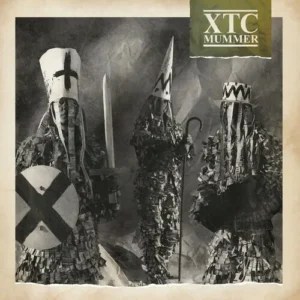
01. Nana Vasconcelos: Saudades
02. Keith Jarrett: Bremen / Lausanne
03. Jon Hassell: Further Fictions
04. Don Cherry et al: Old And New Dreams
05. Hiroshi Yoshimura: Surround
06. Alice Coltrane: Journey In Satchidananda
07. Pharoah Sanders: Pharoah
08. Dorothy Ashby: The Rubayat Of Dorothy Ashby
09. XTC: Chrome Dreams
10. Meiko Kaji: Hajiki Uta
11. Frank Zappa: Over-Nite Sensation (surround)
12. Gary Burton: The New Quartet
13. Neil Young: Chrome Dreams
In der Sprache der Musik natürlich, 50+! Und das ist, was alte Zeiten angeht, zwischen gar-nicht-so-weit-hergeholt und Teenagerjahren, meine Zeitreisensammlung 2024. Einiges habe ich damals gehört, einiges ging an mir vorbei. So kannte ich von „Band on The Run“ nur zwei Hits, bis mir diese wunderbare „Packung“ vor die Ohren kam.My shining star is Ank Anum‘s dyabhingi-fuelled discovery from old London years (1973 again). AnkAnum’s is more suited to a Rastafarian groundation session replete with chalice and enough ganja to rewrite the laws of physics.
Keith Jarretts Standards war ich nach dem Zauber des Anfangs (Standards, Vol. 1, Vol. 2, Changes) bald so leid, dass ich fast eine Bebop-Allergie entwckelte. Nach langer Zeit hörte ich erstmals wieder genau hin, und die pure Spielfreude seines Auftritts in einem geliebten kleinen Jazzclub brach alte Barrieren. Läuft morgen im Toyota, auf dem Weg in die tiefe Eifel! Natürlich dabei, Klaus Walters‘ „Autobahn“!
Sowie „New Ancient Strings“: „After an hour or more spent chasing out the chirping crickets, it was midnight before tranquility was achieved and recording could begin. Toumani and Ballaké played through the night, entirely live, without second takes, improvising around tunes from the classical Mande repertoire. By seven the next morning, the album was done.“
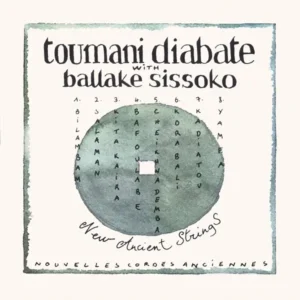
Jakob Bros traumhaftes Album „Taking Turns“ hätte auch zu den „archival discoveries“ gespasst, aber ich bringe dieses Werk von 2014 bei den „neuen Alben“ unter.
Exzellente Surround-, Quad-, und Atmos-Remixe gab es neben King Crimsons „Red“ auch von einigen Joni Mitchell-Alben, von Airs „Moon Safari“ und von „Yoshimi Battles The Pink Robots“ sowie Randy Newmans „Good Old Boys“.
Womöglich erreicht mich erst kurz vor Weihnachten „G stands for Go-Betweens, Vol. 3“. Das grosse traurige erhebende Finale der wundervollen Songschmiede aus Brisbane.
01. Ank Anum: Song Of The Motherland
02.The American Analog Set: New Drifters
03. Alice Coltrane: The Carnegie Hall Concert
04. Taylor / Winstone / Wheeler: Azimuth
05. Paul McCartney and Wings: Band On The Run
06. Jan Garbarek: Afric Pepperbird
07. Can: Live in Paris 1973
08. Günter Schickert: Samtvogel (ENTDECKUNG!!)
09. Peter Thomas: The Tape Masters, Vol. 1
10. Julie Tippetts: Shadow Puppeteer
11. Byard Lancaster: The Complete Palm Recordings 1973-74
12. Toumani Diabate / Ballake Sissoko: New Ancient Strngs
13. Keith Jarrett / Gary Peacock / Paul Motian: The Old Country
Next door to Alice: A guest appearance now from UNCUT making an important point in regards to Alice Coltrane. Her music can open up gates of perception, simple as that, and you don’t have to follow her Hindu way or any other religion to reach a deeper state of mind. Peace, calmness, whatever. A healthy dose of paegan basics, or even pure existenzialism with a smile and an open ear: nothing more required. By the way, don‘t take my ranking too serious – it‘s a simple meditation, like playing solitaire by the window. Alice Coltrane is present here in both years, in that Carnegie night, and on her Journey In Satchidananda, an album that goes deep as deep can go. And what a stellar ensemble, Cecil McBee‘s bass wizardry on the title track, for example.„FINALLY, it appears that Alice Coltrane has taken her deserved place at the top table of 20th-century musical icons, alongside her illustrious husband. Rifle through Uncut’s best albums of 2024 and her influence is everywhere – not just on harpists like the amazing Nala Sinephro and Brandee Younger (who makes several key contributions to Shabaka’s recent album) but on artists as diverse as Julia Holter, The Smile, Arooj Aftab and Dirty Three.
Recorded live in New York in the same month as the release of her spiritual jazz touchstone Journey In Satchidananda, it featured the first two tracks from that album blissfully spun out to more than twice their original length with the help of an expanded ‘double quartet’, including the likes of Jimmy Garrison and Clifford Jarvis. But it’s on an incredible version of John Coltrane’s “Africa” – with Alice having switched from harp to piano – where dual saxophonists Pharoah Sanders and Archie Shepp really earned their corn, trading blazing solos for almost half an hour with no let-up in intensity.
„Found In Transition“ (feat. Henning, Rosato, and me)
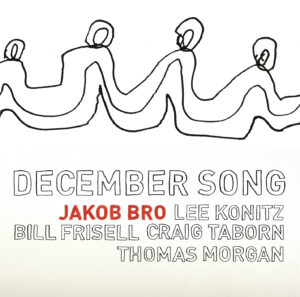
Ein kleiner Rückblick. Springen wir kurz ins Jahr 2013. In den Avatar Studios entsteht der dritte Teil einer Trilogie des dänischen Gitarristen Jakob Bro. HIER die Komposition „Vinterhymne“. Es findet sich auf seinem vorzüglichen Werk „December Song“. Diese drei Alben erschienen alle auf Bros eigenem Label, und „December Song“ wurde ein gefeiertes Album der Musikkritik – auch Henning schrieb Einfühlsames über „December Song“. Auf jedem dieser drei Alben kam es zu einer kleinen Veränderung des Personals, zu den konstant Anwesenden zählten Lee Konitz, Bill Frisell, sowieso Jakob Bro – und der „spirit“ von Paul Motian, der zu Beginn der Trilogie, auf „Balladeering“, noch physisch präsent war. Lee Konitz erlebte im Kreise dieser „Cracks und Legenden“ ein spätes Karriere-High, und Henning zitiert Konitz mit folgenden Worten:
„Ich habe mein ganzes Leben damit verbracht, von Lennie Tristano, Lester Young und all den großen Jazzspielern beeinflusst zu werden, und plötzlich spiele ich ganze Noten und halbe Noten und Akkordfolgen, und ich weiß nicht, warum. Es ist keine Volksmusik, kein Jazz, keine Popmusik, kein Funk, es ist einfach nur Balladenspiel oder was auch immer.“
Was auch immer…. Mit Blick auf eine grossartige Interpretation eines Carla Bley-Stücks schrieb Henning am Ende seiner Besprechung in „Allaboutjazz“: „‚December Song‘ is not just more of the same but opens up a still broader spectrum on a higher level.“Auf diesen drei Alben entwickelte sich eine enorme Empathie der Musiker untereinander, quasi telepathisches Verstehen, das Aufgreifen unausgesprochener Gedanken und ungespielter Klänge – und es war nur folgerichtig, im Jahr darauf einfach noch einmal ins Avatar Studio zu gehen: was die Besetzung anging, nahm Jason Moran die Stelle von Craig Taborn ein, und einen passenderen Schlagwerker als Andrew Cyrille konnte man sich für jene Session nicht erträumen Das Album wurde eingespielt, erschien aber nicht.
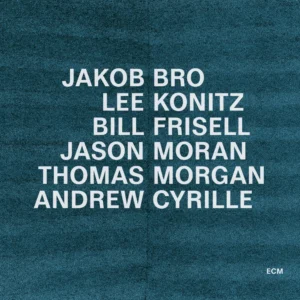
Manfred Eicher kannte wohl diese Aufnahme, wollte aber Jakob Bros Einstieg bei ECM mit einer ganz eigenen Produktion beginnen, und es erschien schliesslich „Gefion“ im Jahre 2015 (produziert noch vor den „Taking Turns“-Sessions im November 2013 in Oslo), mit ECM-Urdrummer Jon Christensen, und Thomas Morgan an der Seite des dänischen Gitarristen. Eine Reihe ganz und gar fesselnder Alben folgte, aber erst jetzt, im Herbst 2024, Ende November, erblickt jene alte Session unter dem Titel „Taking Turns“ das Licht der Welt.
Das Cover macht klar, wer da alles den Ton angibt, obwohl das wohl etwas zu forsch formuliert ist. Wer die alte Trilogie kennt, weiss, dass mitunter die tiefste Musik entsteht, wenn das Ego vollkommen zurückgenommen wird. „Taking Turns“ treibt solche Selbstlosigkeit alias Hingabe noch einmal auf die Spitze. Traumhafter Jazz, nichts weniger! In den JazzFacts Anfang Dezember stelle ich das Album im Deutschlandfunk vor, das als LP, CD und DL vorliegen wird. Und natürlich mit frischen O-Tönen von Jakob Bro. Soviel möchte ich ergänzen: „Taking Turns“ is not just more of the same, but opens up a still broader sprectrum on a higher level.“ Rosato spielte ich das Album vor, und er merkte an: “Was für eine melodische und klangfarbige Polyphonie – sowas bewegt mich!“
„Ness“

Es gibt solche Räume der Natur, zuhauf, in denen sich die dunkle Historie und die Pracht der natürlichen Welt überlagern, verdrängen. Um einen solchen Raum in Suffolk / Norfolk / East Anglia geht es in der „prose poetry“ von Robert Macfarlane. Keine 100 Seiten lang ist dieses Büchlein, und noch hat sich kein Verlag herzulande an die deutsche Übersetzung getraut. Umso bewundernswerter, dass sich der Musiker und Komponist Hayden Thorpe dieser Arbeit genähert hat, in der sich alte und neue Zeiten spiegeln, Todesgefahr, Bombenbau, kalter Krieg. Die Zeiten haben sich nicht geändert, dort aber ist mittlerweile alles, soweit möglich, „renaturiert“. Einmal mehr, nach W. G. Sebalds „Die Ringe des Saturn“, eine fesselnde Wanderung durch Küstengebiete im Südosten Englands: Geschichtsstunde, Meditation, Songrreigen in einem. Was drohen da alles für Fallen (frömmelnde Erhabenheit, ein Himmel voller Geigen, und mehr) – nur scheint mir Hayden Thorpe in keine einzige getappt zu sein. „Ness“ (LP, CD, DL) ist ein Klassealbum.(P.S. „Meine“ Ausgabe der Klanghorizonte im März (Deutschlandfunk, 25.3., 21.05 Uhr) wird – neue „Spielregel“ – nur Alben vorstellen, die zwischen dem August 2024 und April 2025 rauskommen. Also keine „reissues“ (ausser, evtl., einem alten, zeitlosen Stück Musik, das ich im Rahmen von Joe Boyds neuem Buch „And The Rhythm Will Remain“ spiele (aus Kapitel 4, „Latcho Drom“)) – und wenn der Veröffentlichungsrahmen schon so weit gespannt ist, komme ich im März gerne auf solche „in between“-Alben zurück wie Laura Cannells „medieval trips“ oder Haydens „Hauntology“. Die leider nur wenig „airplay“ bekommen. Egal wie weit entfernt die Quellen: alles wird in einen „ocean of sound“ münden, und einer Portion „storytelling“.)
“Latchi drom“ – an introduction to a parallel reading experience
„Late in the first half of Ravi Shankar‘s first New York recital on a 2 February 1957 at Town Hall, Dick Bock fell asleep. Shankar‘s brilliance that evening inspired critics to compare him to Western critical masters and jazz greats, but Indian‘s music immense impact on the West can be traced directly back to Bock‘s doze.
Richard Bock was an early iteration of the West Coast hipster, a hash-smoking bebop buff who had started the Pacific Jazz label a few years earlier to record Gerry Mulligan‘s new quartet with Chet Baker. He was in New York that week, to meet George Avakian, the head of jazz at Columbia Records, hoping to talk him into becoming a partner; together, Bock felt, they could dominate the expanding jazz market. When Avakian went to check out the sitar master Yehudi Menuhin was raving about, Bock tagged along.

With about a third of the seats filled, the concert was a commercial flop, but the audience was enthusiastic and Avakian so intrigued by the parallels to jazz that he offered Shankar a deal to make an album for Columbia. [that was 15 years ahead of me, buying a Ravi Shankar album appeared on the Beatles’ Apple Record label; Anm. v. Michael Engelbrecht, see cover photo] It was Bock, though, who would be the key to Ravi‘s international future. Had he dropped out of boredom? Not at all; Indian music, he explained, „put the listener ina relaxed mood and calm state of mind, which carries him into an area of serenity“. Bock may have then lacked the sixties vocabulary, but he responded as millions would a decade later; he had „tripped out“ on Indian classical music.“
[Any doubts about tripping out? Then listen, and be one of the millions, HERE!] This is the beginning of chapter 4 (pages 282 – 382) and what you‘ve read by now is close to 1/900 of Joe Boyd‘s „And The Rhythm Will Remain – a journey through global music. And as all chapter work independantly from one another, we choose chapter 4 as the content of our fabulous next parallel reading adventure.
Who apart from Brian W. , Michael E. and Olaf W. (just agreed!) will join the reading crew…. those who join the circle will, amongst else, see what the music of Ricardo Baliardo and a Romafest in Paris have to do with Bob Dylan‘s „One more cup of coffee“… but, then again, who needs an appetizer for a book written by the man who gave „White Bicycles“ to the world?
The parallel reading takes place between November 2 and November 23. Four weeks. Every participant has to answer four questions every week (as short or as long as he or she wants them to be). The questions are always the same, and the hundred pages will be read in, well, 4 parts.
- What did really take you by surprise! (Name one, two, or three „wow“-factors!)
- How do you experience to listen to an album you can choose freely from the pages you‘ve been reading?
- What is an interesting connection you haven‘t been conscious about before?
- How do you respond to Joe Boyd‘s writing (content / style, whatever)?
Rarities of Sky

I remember the seaside, smoking
a pipe while reading a paperbook
about how to smoke a pipe.
I stranded, the tongue too hot, that
Scottish Blend a festival of fragrances,
under the palms of Paignton,
hunting for words, rhyming plums
and rums in 1971. All from my picture book,
in which all, there is, is
vanishing. Clouds playing
solitaire in the rarities of sky,
far away, too, the sounds of
a gambling hall with that song
I love so much, on tip of the tongue.(Im Umfeld der Aufnahmen zu seinem letztjährigen Album, das ich für eines seiner schönsten halte, enstanden auch die acht Stücke von „the skies: rarities“. Rund 30 Minuten ist dieses Minialbum lang, und es umfängt mich genauso wie der grosse „Vorgänger“. „Above and Below“ ist für mich ein „instant classic“, die Solopianoversion von „Through The Blue“ ein mit Understatement gespielter Evergreen, der Lust bereitet, wieder sein Debut „Voices“ aus dem Regal zu holen, das einst Bruder Brian mit Dan Lanois in Hamilton, Ontario, produzierte. Übrigens zähle ich das auch zu seinen schönsten Alben. Das kleine Gelegenheitsgedicht schrieb ich, und feilte daran, während das Album dreimal von vorne bis hinten lief. Roger Eno ist ein grosser Wanderer an den Küsten von Suffolk, und ich mischte da eine ferne Erinnerung auf, an einen unvergesslichen Nachmittag an der Küste von Paignton, an dem, bis auf mein Abenteuer mit der Pfeife, rein gar nichts passierte. Ich war 16, und die Baskenmütze auf meinem Kopf habe ich verschwiegen, es wäre auch zu peinlich 😂…)
Sheltering Skies (2 – short review of double vinyl)
27. Juli 1982 an der Cote d‘Azur. King Crimson touren mit dem neu formierten Quartett (Fripp, Belew, Bruford, Levin) durch Europa, meist zusammen mit Roxy Music, und machen Station in Fréjus. Wenn Platten besprochen werden, besteht ein wiederkehrendes Lieblingsmotiv der Musikkritk in dem Ausdruck „dead quiet vinyl“. Nun, diese 200 Gramm-Pressung kommt dem nahe – die komplette Aufnahme ist von roher Direktheit, hyperrealistisch fast, und wer die studiotechnischen Brillianz und Balance der drei Platten des Quartetts kennt, nimmt hier erst mal Adrian Belews Härte 10 auf der elektrischen Gitarre zur Kenntnis, in den ersten dissonanzfreudigen Minuten dieses Doppelalbums. Das klingt und ist knallhart, kein Schmeichler zum Auftakt, und kein Röhrenverstärker würde für mildernde Umstände sorgen. Aber die Ohren adaptieren die Wucht. Das Quartett belegt mit diesem Aufritt einmal mehr, dass King Crimson wohl die einzige Gruppe aus der Ära des Progressiven Rock war, die sich vom Punkvirus äusserst kreativ inspirieren liess. Obwohl Robert Fripps neue Kompositionen einmal mehr ausgeklügelt, detailversessen und anspruchsvoll sind, wird hier rein gar nichts notengetreu abgeliefert. Oder makellos reproduziert. Alles kann jederzeit Feuer fangen. Und fängt Feuer. Deswegen macht hier auch eine andere Lieblingsformel der Musikkritik Sinn: play it loud!
“A painted horizon“
„There‘s a real sense of being repeatedly slammed up against mortality by biology, especially on the salt-scoured „Oceans“. Gibbons sings of ovulation, and exhaustion, in an unusual porous, chalky register, the song ending with her sinking to the (rock) bottom of the sea, „not afraid any more“. If that all sounds bleak, it is. Yet „Lives Outgrown“ is also very beautiful not least when Gibbons quietly sings „it‘s not that i don‘t wanto to return“, on Floating On A Moment‘s contemplation of death.“ (Victoria Segal, Mojo, June)
From the start, all of her works have been collaborative. In the very early days when strolling through small venues and pubs, she often relied on a repertoire of classics, made famous by Nina Simone and Janis Joplin. Later on, in the Portishead years (that perfect trio with Barrow & Utley), the silences in between, and, after the fractured blow away zone of „Third“, out of another nowhere, „Out Of Season“, the album with Paul Webb aka Rustin Man. At last singing Gorecki – all teamwork: the intricacies of her voice, the surrounding sounds, the immaculate productions. Landscapes she‘s been moving through. The urban darkness. The dystopia, the hometown. The hinterland. Between „Dummy“ and „Out Of Season“ a archaic sort of melancholia took center stage, strangely uplifting, elevating. All the way through she led a reluctant life, never hurrying for fame. And now, after a career spanning three decades and more, her first proper solo album, and it comes a long as a sort of farewell.

It took her (and her fabulous companions, former Talk Talk drummer Lee Harris, producer and multi-instrumentalist James Ford, and a well-chosen crew, Raven Bush on cello and violin amongst them) ten years from first sketches to final mixes. Beth’s singing now reaching out so far and deep – not heard that vocal range before. Hypermelodic and far, far out at the same time. Restrainment and passion all over the place (clash of polarities). From a distance, vibes of „The Wicker Man“ and ancient incantations . „Lives Outgrown“ is a unique achievement of kindred spirits, the darkest campfire chamber music we may have heard in quite a while. The listener will soon realize that James Ford’s sophisticated, lush arrangements do not simply embellish the songs artistically, but rather add a second, third layer to them, the famous double bottom, counterpoints, subversive vibrations.
The old stuff laid bare: grief, growing old, losses (and what change is gonna come after sleepless nights for too long). The beyond of the everyday. „On the path / With my restless curiosity / Beyond life / Before me …“ The most „progressive“ instruments: a mellotron, an oscillator, and an electric guitar. Floating lines (on the verge of breaking apart). Passages close to catching fire (and catching fire). The glow, the gloom. Under that nearly controlled delivery of Gibbons‘ singing a high wire tension, most of the time. No involvement of cozy nostalgia, of things coming to rest – in spite of the last song, an invocation of nature and peace of mind, like a dream, at least traces of acceptance. What a terrific work. The most honest review: a painted horizon.„Thinking Music“
Beth Gibbons‘ erstes richtiges Soloalbum ist das lange Warten wert gewesen. Es ist ein kühles, tiefgründiges Set verträumter Folk-Exotica-Beschwörungen, eine seltene Platte, die sich mit den Ängsten und Schmerzen des Erwachsenseins auseinandersetzt und verknotete Emotionen in einer flatterhaften, straffen Instrumentierung und rauchigen, samplebereiten Cinematics seziert. Atemberaubendes Material, produziert von Gibbons in Zusammenarbeit mit James Ford und Lee Harris von Talk Talk.
(So beginnt die zweite Besprechung, die man im Netz finden kann. Bei Boomkat gibt es oft „reviews“, und sie leisten bei diesem Plattenversand sehr gute Arbeit. Gäbe es nicht durch den Zoll massiv erhöhte Preise, und Verzögerungen bei der Lieferung, würde ich viel öfter bei den Briten Musik ordern. Ich kommentiere hier Absatz für Absatz, und ändere nichts an der Deepl-Übersetzung. Interessant, wie der Rezensent Beschreibungen koppelt, die widersprüchlich wirken können: flatterhaft vs. straff, Folk vs. Exotika. Dass die Lieder wie „Beschwörungen“ wirken, kann ich gut nachempfinden.)
Gibbons hat sich bis zum richtigen Moment zurückgehalten, um ihr formvollendetes Debüt zusammenzustellen. Ihr Songwriting kennen wir natürlich schon, nicht nur von der makellosen Portishead-Trilogie, sondern auch vom 2002er-Album „Out of Season“ und dessen Nachfolger „Acoustic Sunlight“, beides Kollaborationen mit Talk Talk-Bassist Paul Webb (alias Rustin Man).
(“Acoustic Sunlight“, davon habe ich noch nie gehört. „Formvollendet“, da stimme ich auf Anhieb zu, ohne lange über den Begriff nachzudenken.)
„Lives Outgrown“ erweitert ihre Technik ein wenig; ihre früheren Kollaborationen bleiben im Schatten, aber dieses Album ist unapologetisch intim und verpackt Geschichten über Liebe, Bedauern und Unruhe in gedämpfte, melancholische Extravaganz. Es ist nicht so vordergründig staubig wie das Portishead-Material oder so sehnig wie ihre Platten mit Webb, sondern eine zerschundene, nachdenkliche Sammlung verletzlicher Reflexionen, die von Musik untermalt wird, die sanften, archaischen Folk, frühen Jazz, Exotica aus den 70ern und düsteren Post-Rock anklingen lässt.
(Wenn ein Album wie dieses schubladenmässig schwer auf den Begriff zu bringen ist, werden gerne Genrenamen mit beiläufig daherkommenden Adjektiven aneinandergereiht, was nicht kritisch gemeint. Dabei entsteht eine angenehme Unschärfe, die unsere Wahrnehmung in bestimmte Richtungen lenkt, ohne die Fantasie einzuengen. Wo ist der „frühe Jazz“ zu hören? Aha, mein geliebtes unscharfes „archaisch“, hier mit „sanft“ gekoppelt. Und dann: „eine zerschundene, nachdenkliche Sammlung verletzlicher Reflexionen, die von Musik untermalt wird…“. „Untermalt“ würde ich hier nicht sagen. Das klingt mehr nach Hintergrundbegleitung. Die Musik um den Gesang herum ist viel mehr als ein „Geschmacksverstärker“, ich erlebe sie hier als „Erweiterung“, „zweite Ebene“, doppelter Boden“.)
Es ist die Art von Material, die Gibbons während ihrer gesamten Karriere angepriesen hat, und zwar so sehr, dass es vertraut erscheint; die Songs haben eine lebendige Qualität, nicht weil sie von anderem Material geklont wurden, sondern weil sie die vollständig realisierten Versionen von Gedanken sind, über die Gibbons seit Jahrzehnten nachgedacht hat.
(Das ist ein interessanter Gedanke. Wir erkennen die Handschrift, aber die Songs wirken auch deshalb so lebendig, weil diese ewig in ihrem Raum schwebenden Gedanken / Empfindungen noch nie so vollständig realisiert wurden. Das „Formvollendete“ wieder mal. Nach den dunklen Andeutungen von Beth Gibbons im offiziellen „presskit“ kommen übrigens einzelne HörerInnen des Albums zu dem Schluss, es könne sich hier um ein Abschiedswerk handeln.)
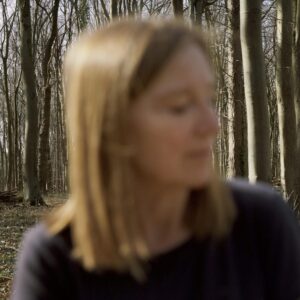
Die Vorab-Single des Albums „Floating on a Moment“ ist ein logischer Anfang. Gibbons‘ Stimme klingt exponierter als je zuvor; die brodelnde, von Nina Simone beeinflusste Traurigkeit, die Portishead zum Kultstatus verholfen hat, ist immer noch da, wird aber durch Erfahrung, Angst und Kummer verstärkt. Ihre Produktion ist ähnlich ausbalanciert: dicke jazzige Basslinien unterstützen federleichte, scheppernde Drums, während die versilberten Breitwandqualitäten, die ihr früheres Material beflügelten, sich zu subtilen Chorälen, klirrenden Streichern und leisen Xylophonen entwickelt haben – mehr Jean-Claude Vannier als Ennio Morricone.
(Ob es eine von Nina Simone beeinflusste Traurigkeit gibt, die Portishead zum Kult verholfen hat, bezweifel ich. Vielleicht ist da ein besondere Grundtraurigkeit in ihrem Gesang gemeint , ein spezielles „Soundfeld von Melancholie“, sofort erkennbar. Wem wurde je attestiert, die traurigste Stimme der Welt zu haben. Zu diesem raren Kreis wurde mal Robert Wyatt gezählt, und zwar nicht selten, auch Beth Gibbons. Und, by the eay, auf dem Album ist „Floating On A Moment“ übrigens das zweite Stück, und ich bin kein Pfennigfuchser. Das Album beginnt mit dem Song / der Beschwörung „Tell me who You Are Today“ (ein noch logischerer, psycho-logisch noch passenderer Anfang des Albums ist das). Und passend zu dem Titel und der Lyrikweberei dieses Songs: schau dir das Cover an: vier Portraits ihres Gesichts, mit geöffneten, geschlossenen Augen. Zunehmende Unschärfe. Ist überhaupt eins scharf, und wirkt das schärfste nicht seltsam maskenhaft?! Dunkler Hintergrund. Insichgekehrtheit. In weiteren Fotos (auf der Pressemappe) fällt auf, wie unscharf ihr Gesicht hier und da wirkt, gegenüber der extrem scharf eingefangenen Natur ringsum. Warum?)
Die Liebe verändert die Dinge“, versichert sie in „Lost Changes“, das zunächst einen raffinierten Alt-Country-Schimmer aufnimmt, bevor epische Orchesterstreicher das überwältigende Melodrama unterstreichen. Im Hintergrund ist mehr los, als man auf den ersten Blick sieht – langsame, hart geschwungene Drums werden durch clevere Avantgarde-Elemente wie quietschende Metallplatten und instabile Oszillator-Drones ergänzt. Oberflächlich betrachtet handelt es sich um Popmusik, aber wenn man den Mutterboden aufreißt, kommen Gibbons‘ tiefere Einflüsse und Inspirationen zum Vorschein wie eine Masse verschlungener Wurzeln.
(Den Absatz kann man gerne zweimal, dreimal lesen. Und da deckt sich etwas mit meinem Hören. Diese zuweilen explodierenden kurzen Passagen des Melodramatischen. So einen Satz mit aufreissendem Mutterboden muss einem erstmal in den Sinn kommen! Welche tieferen Inspirationen meint der Rezensent wohl?)
Reaching Out“ ist sogar noch zerknitterter; Gibbons‘ obere Stimmlage erinnert zunächst an Thom Yorke, aber sie verdoppelt das Tempo und weint schmerzhaft über Northern-Soul-Bass-’n‘-Drum-Drums und blecherne Fanfaren. „I need your love, to silence all my shame“, echot sie, während im Hintergrund geisterhafte Spuren keuchen, wimmern und sich drehen.
(Hier wird es schonungslos intim. Rollenspiel ist das nicht. In einem Werk, in dem das Ich als zweifelhafte Grösse erscheint, kommen, zahlreich, zerknittert, aus Träumen geborgen, die Schatten ins Spiel, als dunkler Reigen.)
Während das frühe Portishead-Material auf den Sample-Bombast von Public Enemy in ihrer Blütezeit zurückgeht, ist „Lives Outgrown“ eher dem unheimlichen Minimalismus von RZA geschuldet, mit seinen schwingenden Streichern und kryptischen, schrägen Sprüchen. Schauen Sie sich nur „Reaching Out“ an, ein gespenstischer Folk-Nieselregen, der mit knochentrockenen fernöstlichen Schlagzeugklängen, Gesangsschleifen und wirbelnden Streicherphrasen unterbrochen wird. Auf „Beyond the Sun“ und „Rewind“ streift Gibbons Nordafrika und Ostasien, wobei sie ihren zerbrechlichen Gesang in ein lokales Gewirr aus Rohrblattklängen, blechernen Saitenzupfern und kantigen Streichern mischt.
(Jetzt gehts aber rund: Nordafrika, Asien. Keiner aber wird hier „weltmusikalische“ Versöhnungen wittern… und doch ist es das Mysterium dieses Albums, dass es, bei allen Abgründen, Trost bereithält, und ganz sicher nicht, weil an den passenden Knöpfen gedreht wurde.)
Auf dem pastoralen Schlussstück des Albums, „Whispering Love“, ist sie zu Hause: „Blätter unseres Lebensbaums, wo die Sommersonne immer durch die Bäume der Weisheit scheint“, gurrt sie, während Vögel singen und akustische Gitarren neben beruhigenden Flöten vibrieren. Es ist ein moosiger Abschluss eines Albums, das drei Jahrzehnte musikalischer Wanderschaft zusammenfasst und einige der ernüchternden Weisheiten, die sie gelernt hat, auf höchst einprägsame Weise vermittelt.
(Wohl nahezu jeder, der den Auftrag gehabt hätte, wäre mit diesem Lied, dieser Anrufung, als Abschluss dahergekommen, der ideale „closer“. Als ich das Album zum ersten Mal gehört habe, von Anfang bis Ende, war ich mir sicher, dass „Lives Outgrown“ fortan an meiner Seite ist, company for life.)
„Kind instruction for falling in love“
Percussionist and drummer and former Talk Talk-member Lee Harris is credited as co-composer of some songs of Beth Gibbons’ forthcoming „Lives Outgrown“. The fact Lee calls the album „a psychedelic, pastoral, wild explosion“, first listenings, and a photo from Beth with a dog in an open landscape made me think of distant relationships with Van Morrison‘s „Veedon Fleece“. Both works seem too unique to be compared with one another, except for the always ungraspable „flow“. Or is there more? Let us think twice and listen to both albums one after the other, perhaps some time in summer. On a long afternoon.
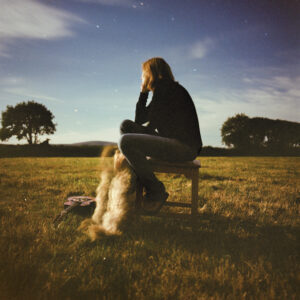
Start with Van‘s album that is much lighter, moodwise (a first and second impression only, i can tell you that) and more sparse in instrumentation – in the end both create their own peculiar air and atmosphere, and depth. A „woody“ feel. Beth‘s work will (i bet on it) make some critics throw in „The Wicker Man“ (a playful, hypermelodic soundtrack for an otherwise noir folk story), while Van‘s songs shy away away from such ghosts creating another green world of flamboyant dreams (a troubadour‘s modus operandi, on the surface, dear reader). Finally they might meet on some middle ground, take their places, and exchange stories about Thomas Hardy‘s „Tess“. Or what the heaven do I know! Whatever draws you in somebody else‘s world! These albums surely do. And about lives outgrown, they both have a whole lot to tell.

So much darkness hidden in the uplifting flow, even dangerous words turn to sounds, at first, on „Veedon Fleece“. Thus „shattering“, and „devastating“ – another common ground between these longplayers from 1974 and 2024. Ben Chasny is „Six Organs of Admittance“, and he writes: „There are so many devastating moments on Van Morrison‘s „Veedon Fleece“ that to list only a few would be total injustice to the rest. But fuck it, what the fuck is just in this world? Well at least we can experience hope in one man’s search for light. Right? So let’s talk about the way Van ends “Linden Arden Stole The Highlights” with the line, „now he’s living with a gun“ and then starts up the very next song by throwing his voice way up on top of his vocal chords and letting it settle down to a calmer note while singing, „oh well it’s lonely, when you’re living with a gun.“ Ah, I’m not a good enough writer to explain how magical it is. You’ll just have to trust me. Or we could talk about how it’s a whiskey drinking record, an alchemical rumination, a journal of his post-divorce drive through the Irish countryside, or his most thoroughly William Blake influenced work ever (just look at his hair on the cover, for Christ’s sake!).“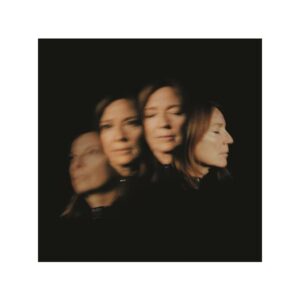
In the first longer text about Beth’s album (Mojo, April) , James Ford reveals that that this first single, „Floating On A Moment“ „is probably one of the cheerier songs. It kind of goes bleaker from there. It’s related to real stuff and it’s from a real place, to the point where it’s almost painful to listen to sometimes. But there’s a beauty in the sadness.” And in a rare statement, Beth adds: “My fifties have brought for ward a new, yet older, horizon. It has been a time of farewells to family, friends and even to who I was before, the lyrics mirroring my anxieties and sleepless nighttime ruminations… I wanted to draw away from breakbeats and snares, focusing on the woody fabric of timbres, away from the sugary addiction of high frequencies.” In strange ways, with their dreamlike voyages, ambivalent textures, and power to transcend the everyday „Veedon Fleece“ and „Lives Outgrown“ deliver some unexpected closeness, so to speak. Beyond being from two redhairs with red-haired dogs. Don‘t wait for summer.